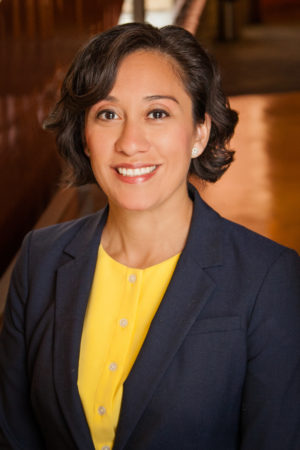Austin City Councilwoman Delia Garza provides insight into the issues affecting our city.
By Sommer Brugal, Photo courtesy of Delia Garza
 Before becoming Austin's District 2 elected representative, Delia Garza was one of the first Mexican-American female firefighters in the Austin Fire Department, tending mainly to South Austin communities, and served as an assistant attorney general in the child-support division.
Before becoming Austin's District 2 elected representative, Delia Garza was one of the first Mexican-American female firefighters in the Austin Fire Department, tending mainly to South Austin communities, and served as an assistant attorney general in the child-support division.
Despite the seemingly obvious differences in the roles, Garza’s commitment to community service and advocacy was always apparent. Today, she continues advocating for her community, working tirelessly to make Austin a welcoming city for everyone. And as a member of the Austin City Council, she’s at the forefront for many of those conversations.
Given Garza’s work within Austin’s various communities and sectors, Austin Woman sat down with the councilwoman to learn about the pressing issues affecting our community today, and what city representatives are doing to address them.
Affordable housing —or lack thereof
According to Garza, housing affordability is the principal issue facing Austin today. It’s a crisis that affects the entire city, but for Garza, its consequences weigh heavier in certain areas than others.
She cites her district to support her claim, as residents in District 2 have a lower median income, compared with others in the city. Income inequality, Garza says, plays a large part in the overall issue.
“As a city, we claim to be progressive politically, but we aren’t progressive [with] land planning,” Garza says. “We’ve held on to the homes with a white picket fence.”
She notes while that image has become synonymous with the American Dream, it doesn’t necessarily enable a city to grow. With the city expected to double in population within the next 15 to 20 years, she says the city—and its residents—can’t continue preserving and protecting single-family lots.
Though Garza doesn’t rid Austin from its responsibility or the role it should play in addressing such an issue, she does speak to the nation’s affordability crisis at large. While the cost of living has gone up in cities like Austin, the amount of money people earn at their jobs hasn’t risen to match that growth. Wages, she says, have remained stagnant.
Mobility challenges
As affordable homes become less available in what’s considered to be Central Austin, the lack of mobility becomes that much more noticeable in a growing city. Mobility is another issue challenging Austin residents, especially those being pushed out.
Most families still have two cars. Those that can’t afford to own multiple vehicles, though, are left to depend on public transportation, which Garza says doesn’t receive ample funding to successfully support the city’s needs.
When asked what led to Austin’s mobility pitfalls and its housing crisis, she notes the city’s lack of progressive thinking for land-use opportunities and a lack of planning for growth.
Moving forward
A number of initiatives are working to address both the housing crisis and mobility concerns the city is facing, the most notable being CodeNext, a major overhaul of the city’s current land-development code.
Though Garza encourages residents to be involved, to understand the changes and recommendations being made, she recognizes much of the discussion surrounding the topic can be complex in nature and often arduous to follow. She believes, however, that while some have worked to keep Austin a tiny college town, there are many voices working for a more streamlined land code and advocating for more sustainable growth for the city.
“There just needs to be a change of mindset,” Garza says. “We should be happy people want to live in Austin, but we need to make the decision to grow properly.”
Speaking in favor of anything prohibiting inclusive growth, she says, is simply not progressive—or welcoming.








